Mable John - Bigger & Better (STAX 215)
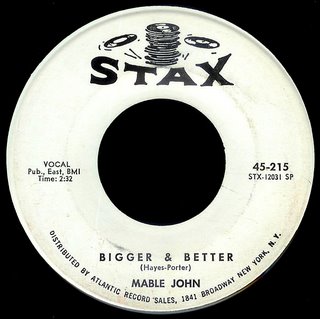
Bigger & Better
Mable John was born in Louisiana, but moved with her family to Arkansas (where younger brother William Edward was born), and then on to Detroit. Her father got work at the Dodge plant, while mother Lillie had her hands full raising her ten children. Once the dinner dishes were washed and put away at night, Lillie would gather the kids around and "have a program", singing traditional gospel tunes while she played the guitar. These informal family sing-a-longs soon attracted the interest of the neighbors, and before long the five oldest siblings had formed a group called "The United Five" that sang locally.
 When brother Little Willie won an amateur night contest at the Paradise Theatre in 1951, it launched his career as one of the all-time great R&B singers. He toured constantly in support of his many top ten hits for King Records, and was caught up in "the life". Mable, meanwhile, was still working in Gospel and was busy raising four kids of her own. "Either be a star, or pack your bags and go home", Willie told her. By 1956, she was filling in for Etta James as the opening act when her brother's "revue" would come to town.
When brother Little Willie won an amateur night contest at the Paradise Theatre in 1951, it launched his career as one of the all-time great R&B singers. He toured constantly in support of his many top ten hits for King Records, and was caught up in "the life". Mable, meanwhile, was still working in Gospel and was busy raising four kids of her own. "Either be a star, or pack your bags and go home", Willie told her. By 1956, she was filling in for Etta James as the opening act when her brother's "revue" would come to town.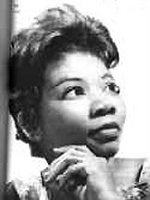 Mable had been working for an Insurance Company for years at this point, and when her supervisor, Bertha Gordy, introduced her to her son Berry, the two became fast friends. Like her, Gordy had the music "in him", and she used to drive him around to different music publishers as he tried to sell the songs he had written. When Gordy composition Lonely Teardrops hit big for Jackie Wilson in 1958, people began to take him seriously. Later that year he founded his own publishing company, Jobete, as well as his own record label, Tamla.
Mable had been working for an Insurance Company for years at this point, and when her supervisor, Bertha Gordy, introduced her to her son Berry, the two became fast friends. Like her, Gordy had the music "in him", and she used to drive him around to different music publishers as he tried to sell the songs he had written. When Gordy composition Lonely Teardrops hit big for Jackie Wilson in 1958, people began to take him seriously. Later that year he founded his own publishing company, Jobete, as well as his own record label, Tamla.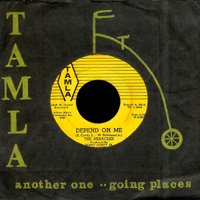 The first female he signed to his new label was, of course, his pal Mable. Her first single, the bluesy Who Wouldn't Love A Man Like That, featured background vocals by aspiring girl group The Primettes (who would later, as I'm sure you know, change their name to The Supremes), and would make Mable the first woman to ever record for the future Tamla/Motown empire, predating Mary Wells' Bye Bye Baby (Motown 1003) by a couple of months.
The first female he signed to his new label was, of course, his pal Mable. Her first single, the bluesy Who Wouldn't Love A Man Like That, featured background vocals by aspiring girl group The Primettes (who would later, as I'm sure you know, change their name to The Supremes), and would make Mable the first woman to ever record for the future Tamla/Motown empire, predating Mary Wells' Bye Bye Baby (Motown 1003) by a couple of months.Although the single (or in fact any of her other three Tamla releases) didn't make the charts, she continued her popularity as a live performer "telling it" to enthusiastic female audiences at sold-out shows in places like The Apollo in NYC and The Howard Theater in DC. As Motown continued to grow, it became obvious that there wasn't much room for her brand of deep soul. "I didn't feel that Motown was a place where I could survive", she said, and, in a tearful meeting at Hitsville USA, Gordy gave his old friend her contract release in 1964.
Mable then moved her base of operations to Chicago, where she began a short stint working for the small Four Brothers label, and hired legendary WVON DJ Lucky Cordell to act as her manager. It was Lucky's friendship with fellow radio man Al Bell that got her signed to STAX in late 1965.
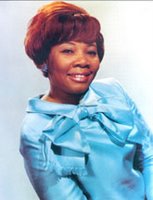 Mable recalls having to chase Isaac Hayes and David Porter around, and practically drag them into the studio. Once they sat down and listened to her talk about what was going on in her life, they were inspired to write some of their best work ever. "I'm not really what you'd call a singer," she'd say, "I'm a storyteller. Like some people sing it, I tell it."
Mable recalls having to chase Isaac Hayes and David Porter around, and practically drag them into the studio. Once they sat down and listened to her talk about what was going on in her life, they were inspired to write some of their best work ever. "I'm not really what you'd call a singer," she'd say, "I'm a storyteller. Like some people sing it, I tell it."And tell it she did. Her very first single for the label was the mighty Your Good Thing (Is About To End), which soared to #6 on the R&B charts in the summer of 1966 (Lou Rawls would take the song even further, going to #3 a few years later). The follow-up record was another absolute classic, You're Taking Up Another Man's Place, which cracked the top 40 on the Cash Box charts that fall.
Today's B side is the flip of her third STAX release, the equally awesome Same Time, Same Place from early 1967. Another Hayes-Porter composition, I just love the arrangement here. Check out Steve Cropper's shimmering Fender, Al Jackson's monumental drum work, and the Isaac Hayes piano just burning it up! Yeah, baby!
She would release four more singles for the label (including the incredible Don't Hit Me No More), but when her baby brother died in prison under mysterious circumstances in May of 1968, her heart just wasn't in it anymore, and she sank into a deep depression.
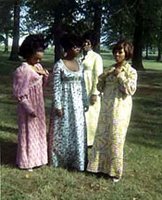 Ray Charles, who was a big fan of her voice, offered her a job as the musical director and leader of his world-famous Raeletts. They became great friends, and the Raeletts toured the world, not only with Brother Ray, but on their own as well. Under Mable's tutelage, they even broke the R&B top 40 twice in 1970 with singles on Charles' Tangerine label.
Ray Charles, who was a big fan of her voice, offered her a job as the musical director and leader of his world-famous Raeletts. They became great friends, and the Raeletts toured the world, not only with Brother Ray, but on their own as well. Under Mable's tutelage, they even broke the R&B top 40 twice in 1970 with singles on Charles' Tangerine label.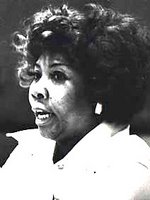 In 1977, Mable left the road behind, and returned to her roots in Gospel Music, serving not only as a performer, but as a producer and manager as well. She is the pastor of her own Joy In Jesus Ministries, which provides evangelistic community outreach to those in need. She also sponsors the annual Christmas All Over L.A. benefit, which grows larger every year. In 1993, she earned a Doctorate of Divinity, and was awarded a Pioneer Award by The Rhythm & Blues Foundation the following year.
In 1977, Mable left the road behind, and returned to her roots in Gospel Music, serving not only as a performer, but as a producer and manager as well. She is the pastor of her own Joy In Jesus Ministries, which provides evangelistic community outreach to those in need. She also sponsors the annual Christmas All Over L.A. benefit, which grows larger every year. In 1993, she earned a Doctorate of Divinity, and was awarded a Pioneer Award by The Rhythm & Blues Foundation the following year.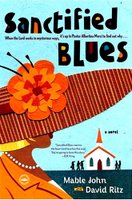 In addition to releasing a Gospel album entitled Where Can I Find Jesus on her own Meda label, Dr. Mabel John's latest accomplishment is becoming a novelist. Co-written with biographer-to-the-stars David Ritz, Sanctified Blues tells the story of an R&B singer who finds her true calling... something she might know a thing or two about! Mable will begin a series of nationwide book-signings later this month.
In addition to releasing a Gospel album entitled Where Can I Find Jesus on her own Meda label, Dr. Mabel John's latest accomplishment is becoming a novelist. Co-written with biographer-to-the-stars David Ritz, Sanctified Blues tells the story of an R&B singer who finds her true calling... something she might know a thing or two about! Mable will begin a series of nationwide book-signings later this month.As the only person to ever make the trip from Hitsville to Soulsville (and beyond), what a tale she has to tell.


















0 Comments:
Post a Comment
<< Home